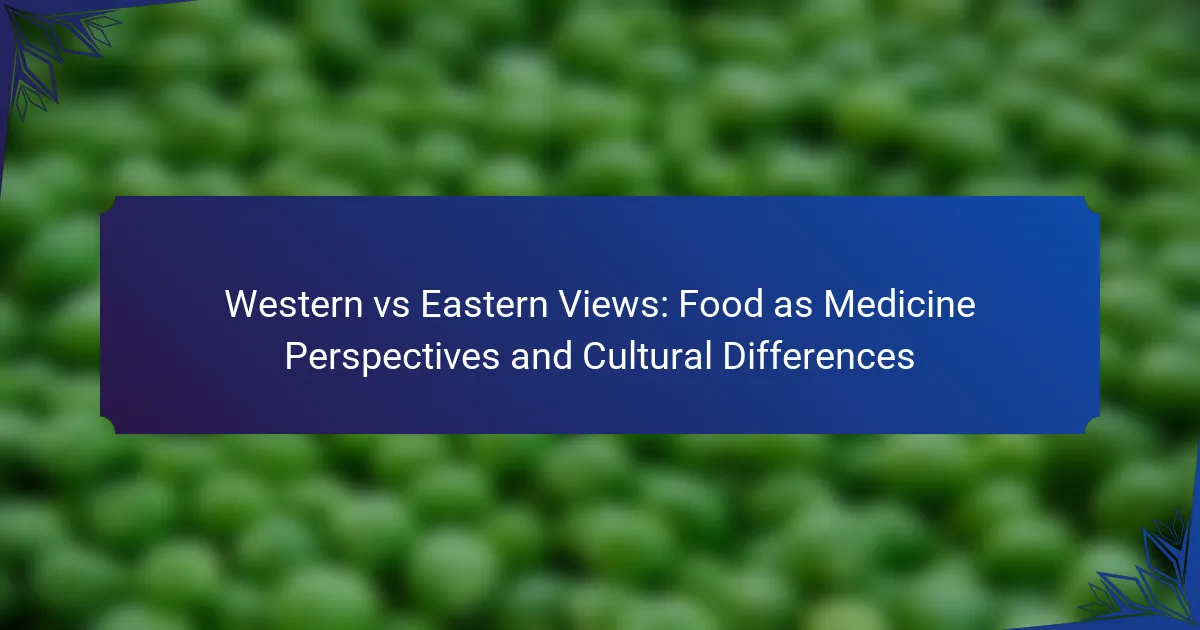The perspectives on food as medicine vary greatly between Western and Eastern cultures, reflecting distinct philosophies and practices. While the Western approach is grounded in scientific research and focuses on specific dietary choices to prevent disease, Eastern traditions emphasize holistic balance and the therapeutic properties of food, as seen in systems like Traditional Chinese Medicine and Ayurveda. These cultural differences shape how individuals perceive and utilize food for health and wellness.

How do Western and Eastern views differ on food as medicine?
Western and Eastern views on food as medicine differ significantly in their approaches and philosophies. The Western perspective often relies on scientific research and empirical evidence, while the Eastern perspective emphasizes holistic practices and balance within the body.
Western perspective emphasizes scientific validation
The Western approach to food as medicine is grounded in scientific validation and clinical research. This perspective prioritizes evidence-based practices, where specific foods and nutrients are studied for their effects on health conditions. For instance, the use of omega-3 fatty acids from fish to reduce inflammation is supported by numerous studies.
Healthcare professionals in Western countries often recommend dietary changes based on scientific findings, focusing on measurable outcomes. This can include dietary guidelines established by organizations such as the USDA, which promote specific food groups for health benefits.
Eastern perspective focuses on holistic balance
In contrast, the Eastern view of food as medicine is rooted in holistic principles that consider the body, mind, and spirit as interconnected. Traditional practices such as Traditional Chinese Medicine (TCM) and Ayurveda emphasize balance and harmony, suggesting that food can restore equilibrium in the body. For example, TCM categorizes foods based on their energetic properties and how they affect the body’s yin and yang.
This perspective often involves personalized dietary recommendations that take into account an individual’s constitution, seasonal changes, and specific health conditions. Herbs, spices, and whole foods are commonly used to enhance well-being and prevent illness.
Examples of cultural practices in both views
In Western cultures, practices such as the Mediterranean diet highlight the consumption of fruits, vegetables, whole grains, and healthy fats, which are linked to lower risks of chronic diseases. Nutritional supplements are also widely used to address specific health issues, such as vitamin D for bone health.
Conversely, Eastern practices include the use of herbal teas, such as ginger or chamomile, for digestive health or relaxation. Fermented foods like kimchi and miso are valued for their probiotic benefits, promoting gut health and overall wellness. Both perspectives offer valuable insights into how food can be utilized for health, each with its unique methodologies and cultural significance.

What are the practical applications of food as medicine in Western cultures?
In Western cultures, food as medicine emphasizes the use of dietary choices to promote health and prevent disease. This approach often incorporates supplements and specific food categories known for their health benefits.
Use of supplements like Omega-3 for heart health
Omega-3 fatty acids are widely recognized in Western medicine for their role in supporting heart health. These supplements, often derived from fish oil or flaxseed, can help reduce inflammation and lower triglyceride levels.
For optimal heart health, many health professionals recommend a daily intake of around 1,000 mg of Omega-3s. However, individuals should consult with a healthcare provider before starting any supplement regimen to avoid potential interactions with medications.
Incorporation of superfoods in diets
Superfoods, such as blueberries, quinoa, and kale, are increasingly popular in Western diets due to their high nutrient density and health benefits. These foods are often promoted for their antioxidant properties and ability to combat chronic diseases.
To effectively incorporate superfoods, aim to include a variety of them in your meals throughout the week. For example, adding a handful of berries to breakfast or using quinoa as a base for salads can enhance nutritional intake. However, it’s essential to balance these foods with a diverse diet to ensure overall health.

What are the practical applications of food as medicine in Eastern cultures?
In Eastern cultures, food is often viewed as a vital component of health and wellness, with specific dietary practices designed to promote balance and healing. Traditional systems like Traditional Chinese Medicine (TCM) and Ayurveda emphasize the therapeutic properties of foods, guiding individuals in their dietary choices to enhance physical and mental well-being.
Traditional Chinese Medicine dietary practices
In Traditional Chinese Medicine, food is categorized based on its energetic properties, such as warming or cooling effects. Practitioners recommend specific foods to address imbalances in the body’s yin and yang, as well as to support the five elements: wood, fire, earth, metal, and water. For example, ginger and garlic are often used to warm the body, while cucumber and watermelon are favored for their cooling properties.
Common practices include consuming seasonal foods and incorporating herbs into meals. For instance, in winter, hearty soups with warming spices are encouraged, while lighter, refreshing dishes are preferred in summer. This approach not only supports physical health but also aligns with the natural rhythms of the environment.
Ayurvedic principles in Indian cuisine
Ayurveda, the traditional Indian system of medicine, emphasizes the importance of food in maintaining health and preventing disease. It categorizes foods based on their taste (rasa), energy (virya), and post-digestive effect (vipaka), guiding individuals to choose foods that balance their unique dosha—vata, pitta, or kapha. For instance, a person with a pitta constitution may benefit from cooling foods like coconut and cucumber.
Meal preparation often includes spices known for their medicinal properties, such as turmeric for its anti-inflammatory effects and cumin for digestion. Additionally, Ayurveda promotes mindful eating practices, encouraging individuals to eat in a calm environment and to listen to their body’s hunger cues. This holistic approach fosters not only physical health but also emotional and spiritual well-being.

How can supplements bridge the gap between these perspectives?
Supplements can serve as a common ground between Western and Eastern views on food as medicine by providing targeted benefits that align with both philosophies. They can enhance health and well-being through natural ingredients, addressing specific health concerns while respecting cultural practices.
Adaptogenic herbs for stress management
Adaptogenic herbs, such as ashwagandha, rhodiola, and holy basil, are known for their ability to help the body adapt to stress and promote balance. These herbs work by modulating the body’s stress response, potentially lowering cortisol levels and enhancing resilience.
When considering adaptogens, it’s essential to choose high-quality supplements that have been tested for purity and potency. A typical dosage can range from 300 to 600 mg per day, depending on the specific herb and individual needs. Always consult with a healthcare provider before starting any new supplement regimen.
Probiotics for gut health
Probiotics are live microorganisms that can provide health benefits, particularly for gut health. They help maintain a balanced gut microbiome, which is crucial for digestion, immune function, and overall well-being. Common strains include Lactobacillus and Bifidobacterium.
For effective results, look for probiotic supplements containing at least 1 billion CFUs (colony-forming units) per serving. It’s advisable to choose products that specify the strains included and have been clinically studied. Incorporating fermented foods like yogurt, kefir, and kimchi can also enhance gut health naturally.

What criteria should be considered when choosing supplements?
When selecting supplements, it’s essential to evaluate the quality of ingredients, scientific evidence supporting their effectiveness, and personal health needs. These criteria help ensure that the supplements you choose are safe, effective, and beneficial for your specific health goals.
Quality and sourcing of ingredients
The quality of supplement ingredients significantly impacts their effectiveness. Look for products that use high-quality, natural ingredients sourced from reputable suppliers. Certifications such as GMP (Good Manufacturing Practices) or NSF International can indicate that the product meets certain quality standards.
Additionally, consider the sourcing of ingredients. Supplements derived from whole foods or organic sources may offer better bioavailability and fewer contaminants. Always check labels for transparency regarding sourcing and manufacturing processes.
Scientific backing and efficacy
It’s crucial to assess the scientific evidence supporting the efficacy of a supplement. Look for products that reference clinical studies or peer-reviewed research demonstrating their benefits. Supplements with strong scientific backing are more likely to deliver the promised results.
Be cautious of supplements that make bold claims without substantial evidence. A good rule of thumb is to prioritize those with endorsements from health professionals or organizations. This can help you avoid products that may not be effective or could even be harmful.

What are the cultural influences on dietary supplements?
Cultural influences significantly shape the perception and use of dietary supplements across different regions. In many Eastern cultures, food is often viewed as a form of medicine, while Western perspectives tend to emphasize supplements as health enhancers or preventive measures.
Regional preferences for herbal remedies
In Eastern cultures, particularly in countries like China and India, herbal remedies are deeply integrated into traditional medicine practices. Herbs such as ginseng, turmeric, and ashwagandha are commonly used for their perceived health benefits, often tailored to individual needs based on holistic principles.
Conversely, Western countries have historically favored synthetic supplements, although there is a growing interest in herbal products. Popular herbs like echinacea and garlic are now widely available, reflecting a shift towards more natural remedies in mainstream health practices.
Trends in plant-based supplements in the West
In recent years, the Western market has seen a surge in demand for plant-based supplements, driven by increasing health consciousness and a preference for natural products. Ingredients like spirulina, chlorella, and various adaptogenic herbs are gaining traction among consumers seeking alternatives to traditional pharmaceuticals.
Regulatory bodies, such as the FDA in the United States, have begun to provide clearer guidelines on labeling and health claims for these supplements. Consumers should look for products that are certified organic or third-party tested to ensure quality and efficacy.

How do food as medicine views impact health outcomes?
Food as medicine perspectives significantly influence health outcomes by promoting dietary choices that enhance well-being and prevent disease. These views encourage individuals to use nutrition as a primary tool for maintaining health, leading to improved physical and mental conditions.
Case studies of improved wellness through diet
Numerous case studies illustrate the benefits of dietary changes on health. For instance, a group of patients with type 2 diabetes in the United States saw significant improvements in blood sugar levels after adopting a plant-based diet rich in whole foods. Similarly, traditional Mediterranean diets have been linked to lower rates of heart disease and improved longevity.
In Eastern cultures, such as in traditional Chinese medicine, specific foods are often prescribed to balance the body’s energy and enhance healing. For example, ginger and garlic are commonly used to boost immunity and improve digestion, showcasing the practical application of food as medicine.
Comparative health statistics between cultures
Health statistics reveal stark differences in outcomes based on dietary practices across cultures. For example, countries in the Mediterranean region, where diets are high in fruits, vegetables, and healthy fats, report lower incidences of cardiovascular diseases compared to Western nations with higher processed food consumption.
In contrast, Asian countries often emphasize the use of herbs and spices in their diets, contributing to lower obesity rates and chronic diseases. The World Health Organization notes that dietary patterns significantly affect life expectancy, with populations adhering to traditional diets generally enjoying better health outcomes.

What emerging trends are shaping the future of food as medicine?
Emerging trends in food as medicine are increasingly integrating holistic approaches with scientific research, emphasizing the role of nutrition in health and wellness. This shift is driven by a growing awareness of chronic diseases and the potential of dietary interventions to improve health outcomes.
Personalized Nutrition
Personalized nutrition tailors dietary recommendations based on individual genetic, metabolic, and lifestyle factors. This approach recognizes that one-size-fits-all diets may not be effective for everyone, leading to more targeted interventions that can enhance health and prevent disease.
For example, genetic testing can reveal how a person metabolizes certain nutrients, allowing for customized meal plans that optimize health benefits. This trend is gaining traction in both Western and Eastern practices, where individual health profiles are increasingly considered in dietary choices.
Plant-Based Diets
Plant-based diets are gaining popularity as a means of promoting health and preventing chronic diseases. These diets emphasize whole foods, such as fruits, vegetables, legumes, and whole grains, which are rich in essential nutrients and antioxidants.
Research suggests that incorporating more plant-based foods can reduce the risk of heart disease, diabetes, and certain cancers. Many people are transitioning to these diets not only for health reasons but also for environmental sustainability, reflecting a broader cultural shift towards mindful eating.
Functional Foods
Functional foods, which provide health benefits beyond basic nutrition, are becoming a key focus in the food as medicine movement. These foods may include probiotics, omega-3 fatty acids, and fortified products that support specific health outcomes.
For instance, foods rich in omega-3s, like fatty fish or flaxseeds, are linked to improved heart health. Consumers are increasingly seeking out these products, prompting manufacturers to innovate and expand their offerings in the market.
Integration of Technology
Technology is transforming how individuals approach food as medicine, with apps and wearable devices providing personalized health insights. These tools can track dietary intake, monitor health metrics, and offer tailored recommendations based on user data.
For example, mobile applications can help users log their meals and receive feedback on nutritional content, making it easier to adhere to dietary guidelines. This integration of technology enhances accessibility and empowers individuals to take charge of their health through informed food choices.
